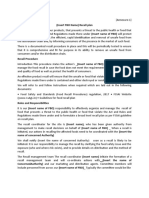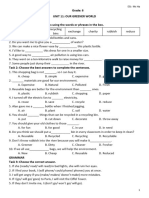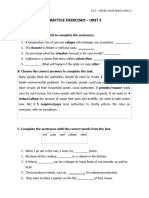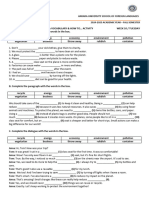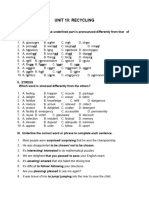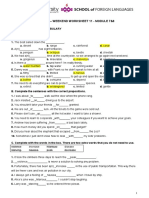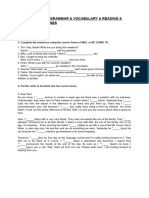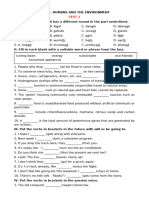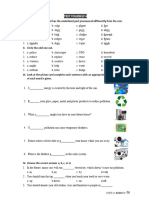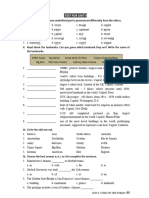Unit 11: Our Greener World
Uploaded by
kimyellyn1910Unit 11: Our Greener World
Uploaded by
kimyellyn1910UNIT 11 OUR GREENER WORLD
A. PHONETICS
I. Write the sound /ɑː/ or /æ/ of the letter a underlined.
1. market / / 6. class / / 11. natural / /
2. bag / / 7. stand / / 12. bath / /
3. plastic / / 8. have / / 13. answer / /
4. thank / / 9. traffic / / 14. animal / /
5. plant / / 10. father / / 13. wrap / /
II. Choose the word which has a different sound in the underlined part.
1. a. afternoon b. can c. lack d. animal
2. a. paper b. way c. prepare d. later
3. a. party b. glass c. plant d. plastic
4. a. happy b. match c. package d. save
5. a. swap b. vase c. watch d. want
B. VOCABULARY AND GRAMMAR
I. Match the word with its meaning.
1. reuse a. to keep something to use in the future
2. reduce b. to give something to someone in exchange for something else
3. recycle c. to use something again
4. save d. to make something start working
5. wrap e. to make something less
6. swap f. to cover something completely in paper
7. turn on g. to make something stop working
8. turn off h. to treat waste materials so that they can be used again
II. Complete the sentences with the word(s) from the box.
deforestation noise air environment water soil
1. Our ________________ is becoming more and more polluted.
2. ________________ is destroying large areas of tropical rain forest.
3. ________________ pollution can cause diseases such as asthma and bronchitis.
4. ________________ pollution affects drinking water, rivers, lakes and oceans.
5. ________________ pollution can lead to famines if the plants are unable to grow in it.
6. ________________ pollution can cause hearing problems.
III. Underline the correct words.
1. These materials are recycled/ reduced into other packaging products.
2. These containers are refutable/ reusable. You can use them again.
54 BÀI TẬP TIẾNG ANH 6 - PHẦN BÀI TẬP
3. Try to reduce/ reuse the amount of wastes you produce.
4. Please turn the television on/ off before you go to bed.
5. Take these old newspapers to the recycling/ recycled bin.
6. If more people cycle, there will be less/ more air pollution.
7. Recycle/ Reuse old clothing by donating it to a local charity.
8. We can waste/ save a lot of trees if we recycle waste paper.
IV. Put the verbs in brackets into the correct form.
1. We _____________ (stay) at home if it rains.
2. She will call you if she _____________ (have) time.
3. If it _____________ (not rain) tomorrow, we will go for a picnic.
4. If everyone ____________ (recycle) paper, metal and glass, we ____________ (not produce)
so much rubbish.
5. If you _____________ (not water) plants, they _____________ (die).
6. If the weather _____________ (be) bad, we _____________ (not go) to the park.
7. We ____________ (save) thousands of trees if we ____________ (not waste) so much paper.
8. What _____________ (happen) if we _____________ (keep) polluting the environment.
9. If we _____________ (not stop) cutting down so many trees, we _____________ (endanger)
our oxygen supply.
10. If people _____________ (dump) chemicals into rivers, they _____________ (not be) able to
swim in them in the future.
V. Circle the correct word or phrase.
1. If the weather is / will be fine, the children walk / will walk to school.
2. I lend / will lend you my laptop if you promise / will promise to be careful with it.
3. If they don’t do / won’t do their homework, their teacher punish / will punish them.
4. Jane gets / will get lost if she doesn’t have / won’t have the town map.
5. If I see / will see Ken later today, I tell / will tell him to call you.
6. My mother buys / will buy me a present if I pass / will pass my exams.
7. If there is / will be no water, all living things die / will die.
8. You aren’t / won’t be able to sleep if you watch / will watch horror movies.
VI. Write the first conditional sentences using the cues given.
1. If/ Sue/ not hurry/ she/ miss/ the bus
_________________________________________________________
2. Rita/ pass/ the exam/ if/ she/ study/ hard
_________________________________________________________
3. If/ he/ watch/ too much television/ he/ hurt/ his eyes
_________________________________________________________
4. If/ it/ not be/ sunny/ tomorrow/ we/ not go/ to the beach
_________________________________________________________
5. We/ visit/ her/ if / we/ have/ time
_________________________________________________________
6. I/ not wait/ if/ you/ arrive/ late
Unit 11: OUR GREENER WORLD 55
_________________________________________________________
7. They/ not play/ tennis/ tomorrow/ if/ it/ rain
_________________________________________________________
8. If/ you/ not set/ your alarm clock/ you/ not wake up/ on time
_________________________________________________________
VII. Match the two halves of these conditional sentences.
1. If man keeps polluting the environment, a. we will endanger our oxygen supply.
2. If we dump all sorts of chemicals into rivers, b. sea levels will rise too.
3. If we don’t stop cutting down so many trees, c. there won’t be so much waste.
4. If the global temperature rises, d. they will run out of drinking water one
day.
5. If more people use reusable shopping bags, e. we will save a lot of electricity.
6. If people don’t use water more wisely, f. we won’t be able to swim in them.
7. If everyone turns off unwanted lights. g. earth will be in danger.
VIII. Complete each sentence with an appropriate preposition.
1. You can buy reusable shopping bags __________ the check-out.
2. The three Rs stand __________ Reduce, Reuse and Recycle.
3. These shopping bags are made __________ natural materials.
4. Don’t throw old things __________. Try to find another use for them.
5. You should turn the tap __________ when you brush your teeth.
6. You shouldn’t wrap the food __________ a plastic bag.
7. Give your old clothes __________ charity.
8. You should swap your clothes __________ your friends or cousins.
C. SPEAKING
I. Complete this dialogue with the sentences from the box.
Deforestation is one of them. We should plant more trees.
Have you any problem? Is smoke responsible for air pollution?
How can we prevent air pollution? what is the cause of air pollution?
Matt: Hi, Jane. I want to talk to you about air pollution. (1)______________________
Jane: No problem. Carry on.
Matt: According to you (2)______________________
Jane: here are many causes of air pollution. (3)______________________
Matt: (4)______________________
Jane: Yes, it is. Besides this, the chemicals of mills and factories pollute the air.
Matt: (5)______________________
Jane: We should be conscious about environment. (6)______________________
Matt: Thank you very much.
Jane: You’re welcome.
II. Reorder the sentences to make a dialogue.
56 BÀI TẬP TIẾNG ANH 6 - PHẦN BÀI TẬP
_____ It’s a good idea!
_____ But you can recycle that!
_____ A reusable container? What for?
_____ They don’t really do anything with this, do they?
__1__ What are you doing?
_____ Sure they do. They make boxboard for cereal.
_____ And you should bringing your lunch in a reusable container.
_____ I’m throwing away this cardboard box.
_____ To reduce waste.
_____ Oh, well I guess I’ll recycle it!
D. READING
I. Complete the passages with the words from the box.
what recycled protect later throw waste reuse natural
How people can help with recycling?
As inhabitants of the earth we all have a duty to (1)________ the environment. We should
contribute to environmental protection by finding new ways of using products we (2)________
away. Nowadays recycling is an industry. As the world’s (3)________ resources run out,
manufacturers must find ways of reusing products. (4)________ can we do to help our
environment?
♦ We can sort our (5)__________ by separating it and then taking it to the appropriate recycling
bins.
♦ We can (6)__________ things such as jars and envelopes.
♦ We can buy (7)__________ products like stationery.
♦ We can transform our waste food into a fertilizer which we may use as compost for our gardens
(8)__________
II. Read the passage then choose the correct answers.
Green Cities
What makes a city green? It’s a huge challenge for cities to be earth-friendly. Not only do they
have lots of people, buildings, traffic, trash, and air pollution, but they also consume more than
half of the world’s energy.
Many cities in the world have taken up the challenge to be earth-friendly. Look at what some of
these cities have done:
Reykjavik, Iceland, is run entirely on green energy. Its transit system uses hydrogen buses and
most of its buildings use non-polluting energy sources like geothermal and hydroelectricity.
Malmo and Stockholm in Sweden are noted for their green spaces and parks and for
successfully cleaning up their water and air.
Portland, Oregon, was one of the first American cities to focus on earth-friendly transit with
light-rail and bike paths to encourage people to leave their cars at home.
Curitiba, Brazil, uses unique green methods for maintenance. Their grass parks are trimmed by
sheep!
Vancouver, British Columbia, uses wind, solar, and water energy to generate power. Nearly all
Unit 11: OUR GREENER WORLD 57
of the city is powered by clean hydroelectricity.
1. In what country is Malmo?
a. Brazil b.Spain c.Sweden d.Iceland
2. How much of the world’s energy is consumed by cities?
a. one quarter b. one and a half c. more than half d.all
3. Which city is run entirely on green energy?
a. Reykjavik b.Seattle c.Stockholm d. Portland
4. How are the buses powered in Reykjavik?
a. diesel fuel b.hydrogen c.unleaded gasoline d.geothermal
5. How does the grass get cut in the parks of Curitiba?
a. They use push mowers. b. Children stomp on it.
c. People trim it off. d. Sheep graze on it.
6. None of Vancouver is powered by hydroelectricity.
a. True b.False c.No information
7. Portland, Oregon was one of the first US cities to focus on earth-friendly transit.
a. True b. False c. No information
E. WRITING
I. Write the first conditional sentences.
1. You should work hard, or you won’t pass the exam.
If _______________________________________________________
2. Henry fails his examination. His parents will be sad.
If _______________________________________________________
3. Sue shouldn’t go out this weekend, or she won’t have time to study.
If _______________________________________________________
4. I think it’ll snow tomorrow. I will go skiing.
If _______________________________________________________
5. He should leave soon, or he’ll miss the bus.
If _______________________________________________________
6. Don’t play with matches. You will hurt yourself.
If _______________________________________________________
II. Complete the sentences with your own words.
1. If we all use reusable shopping bags, __________________________________________
2. If more people cycle, ______________________________________________________
3. We will save a lot of trees if ________________________________________________
4. A lot of fish will die if _____________________________________________________
5. If you have a shower instead of a bath, ________________________________________
58 BÀI TẬP TIẾNG ANH 6 - PHẦN BÀI TẬP
You might also like
- FSSAI Food Recall Plan Sample Template Free PDF File0% (1)FSSAI Food Recall Plan Sample Template Free PDF File4 pages
- New Adjustable Frequency Radiant Charger PDF100% (7)New Adjustable Frequency Radiant Charger PDF5 pages
- Bài tập tiếng anh 6 Global Mai Lan Hương _ Hà Thanh Uyên Bai-11No ratings yetBài tập tiếng anh 6 Global Mai Lan Hương _ Hà Thanh Uyên Bai-1114 pages
- Thuvienhoclieu.com Bai Tap Tieng Anh 6 Bai 11No ratings yetThuvienhoclieu.com Bai Tap Tieng Anh 6 Bai 119 pages
- Test For Unit 11: Unit 11: Our Greener WorldNo ratings yetTest For Unit 11: Unit 11: Our Greener World4 pages
- Bồi dưỡng TA Smart World 8 UNIT 3.PROTECTING THE ENVIRONMENTNo ratings yetBồi dưỡng TA Smart World 8 UNIT 3.PROTECTING THE ENVIRONMENT12 pages
- Homework: Lịch học: Thứ 4: 19h30 - 21h15 Chủ nhật: 17h30 - 19h15No ratings yetHomework: Lịch học: Thứ 4: 19h30 - 21h15 Chủ nhật: 17h30 - 19h152 pages
- Bài Tập Anh 8 Global Lưu Hoàng Trí 7. Unit 7. Environmental Protection.docxNo ratings yetBài Tập Anh 8 Global Lưu Hoàng Trí 7. Unit 7. Environmental Protection.docx22 pages
- Bai Tap Thuc Hanh Unit 7 Environmental Protection Tieng Anh 8 Global Success Mai Lan HuongNo ratings yetBai Tap Thuc Hanh Unit 7 Environmental Protection Tieng Anh 8 Global Success Mai Lan Huong11 pages
- EXTRA VOCABULARY HOW TO... ACTIVITY - TUESDAYNo ratings yetEXTRA VOCABULARY HOW TO... ACTIVITY - TUESDAY2 pages
- Bài tập tiếng anh 8 Global succes MLH - HTU UNIT 7. ENVIRONMENTAL PROTECTIONNo ratings yetBài tập tiếng anh 8 Global succes MLH - HTU UNIT 7. ENVIRONMENTAL PROTECTION20 pages
- I A. Read The Following Test Carefully. The LeopardNo ratings yetI A. Read The Following Test Carefully. The Leopard5 pages
- Pupe 21-22 Stream 2 Worksheet 11 Int U7&8No ratings yetPupe 21-22 Stream 2 Worksheet 11 Int U7&85 pages
- Bài tập Global Success 9 (Mai Lan Hương _ Hà Thanh Uyên) 6. UNIT 6. VIETNAMESE LIFESTYLE - THEN AND NOWNo ratings yetBài tập Global Success 9 (Mai Lan Hương _ Hà Thanh Uyên) 6. UNIT 6. VIETNAMESE LIFESTYLE - THEN AND NOW25 pages
- 2324_tieng Anh 9_Dap an de cuong giua ki II_TDNNo ratings yet2324_tieng Anh 9_Dap an de cuong giua ki II_TDN3 pages
- Test For Unit 10: Bài T Ập Tiếng Anh 6 - Phần Bài TậpNo ratings yetTest For Unit 10: Bài T Ập Tiếng Anh 6 - Phần Bài Tập4 pages
- Test For Unit 9: Unit 9: Cities of The WorldNo ratings yetTest For Unit 9: Unit 9: Cities of The World4 pages
- A. Phonetics: Bài T Ập Tiếng Anh 6 - Phần Bài TậpNo ratings yetA. Phonetics: Bài T Ập Tiếng Anh 6 - Phần Bài Tập7 pages
- Bài tập hiện tại tiếp diễn: Exercise 6: Chia động từNo ratings yetBài tập hiện tại tiếp diễn: Exercise 6: Chia động từ2 pages
- Chemistry: GCE Ordinary Level (2017) (Syllabus 5073)No ratings yetChemistry: GCE Ordinary Level (2017) (Syllabus 5073)30 pages
- Discuss The Medical and Industrial Uses of Gamma RaysNo ratings yetDiscuss The Medical and Industrial Uses of Gamma Rays5 pages
- NURS FPX 6016 Assessment 1 Adverse Event or Near-Miss AnalysisNo ratings yetNURS FPX 6016 Assessment 1 Adverse Event or Near-Miss Analysis6 pages
- History of Telemedicine Evolution Context and TranNo ratings yetHistory of Telemedicine Evolution Context and Tran2 pages
- Quick Revision Notes Class 12 Chemistry Term 1 1No ratings yetQuick Revision Notes Class 12 Chemistry Term 1 114 pages
- Auto Credit Payment Notice: Philippine Health Insurance CorporationNo ratings yetAuto Credit Payment Notice: Philippine Health Insurance Corporation2 pages
- Christian Claudie Sg. de Luna: ObjectiveNo ratings yetChristian Claudie Sg. de Luna: Objective2 pages
- A-A-17323 MF Activa 7340-7344 Brochure Eng V7 UBNo ratings yetA-A-17323 MF Activa 7340-7344 Brochure Eng V7 UB11 pages
- Plimat Abs Solvent Cement Bot 250Ml 24 En: Safety Data Sheet100% (1)Plimat Abs Solvent Cement Bot 250Ml 24 En: Safety Data Sheet8 pages
- IATG 01.50 UN Explosive Classification System and Codes v.2No ratings yetIATG 01.50 UN Explosive Classification System and Codes v.229 pages
- FSSAI Food Recall Plan Sample Template Free PDF FileFSSAI Food Recall Plan Sample Template Free PDF File
- Bài tập tiếng anh 6 Global Mai Lan Hương _ Hà Thanh Uyên Bai-11Bài tập tiếng anh 6 Global Mai Lan Hương _ Hà Thanh Uyên Bai-11
- Bồi dưỡng TA Smart World 8 UNIT 3.PROTECTING THE ENVIRONMENTBồi dưỡng TA Smart World 8 UNIT 3.PROTECTING THE ENVIRONMENT
- Homework: Lịch học: Thứ 4: 19h30 - 21h15 Chủ nhật: 17h30 - 19h15Homework: Lịch học: Thứ 4: 19h30 - 21h15 Chủ nhật: 17h30 - 19h15
- Bài Tập Anh 8 Global Lưu Hoàng Trí 7. Unit 7. Environmental Protection.docxBài Tập Anh 8 Global Lưu Hoàng Trí 7. Unit 7. Environmental Protection.docx
- Bai Tap Thuc Hanh Unit 7 Environmental Protection Tieng Anh 8 Global Success Mai Lan HuongBai Tap Thuc Hanh Unit 7 Environmental Protection Tieng Anh 8 Global Success Mai Lan Huong
- Bài tập tiếng anh 8 Global succes MLH - HTU UNIT 7. ENVIRONMENTAL PROTECTIONBài tập tiếng anh 8 Global succes MLH - HTU UNIT 7. ENVIRONMENTAL PROTECTION
- I A. Read The Following Test Carefully. The LeopardI A. Read The Following Test Carefully. The Leopard
- Bài tập Global Success 9 (Mai Lan Hương _ Hà Thanh Uyên) 6. UNIT 6. VIETNAMESE LIFESTYLE - THEN AND NOWBài tập Global Success 9 (Mai Lan Hương _ Hà Thanh Uyên) 6. UNIT 6. VIETNAMESE LIFESTYLE - THEN AND NOW
- Test For Unit 10: Bài T Ập Tiếng Anh 6 - Phần Bài TậpTest For Unit 10: Bài T Ập Tiếng Anh 6 - Phần Bài Tập
- A. Phonetics: Bài T Ập Tiếng Anh 6 - Phần Bài TậpA. Phonetics: Bài T Ập Tiếng Anh 6 - Phần Bài Tập
- Bài tập hiện tại tiếp diễn: Exercise 6: Chia động từBài tập hiện tại tiếp diễn: Exercise 6: Chia động từ
- Chemistry: GCE Ordinary Level (2017) (Syllabus 5073)Chemistry: GCE Ordinary Level (2017) (Syllabus 5073)
- Discuss The Medical and Industrial Uses of Gamma RaysDiscuss The Medical and Industrial Uses of Gamma Rays
- NURS FPX 6016 Assessment 1 Adverse Event or Near-Miss AnalysisNURS FPX 6016 Assessment 1 Adverse Event or Near-Miss Analysis
- History of Telemedicine Evolution Context and TranHistory of Telemedicine Evolution Context and Tran
- Auto Credit Payment Notice: Philippine Health Insurance CorporationAuto Credit Payment Notice: Philippine Health Insurance Corporation
- Plimat Abs Solvent Cement Bot 250Ml 24 En: Safety Data SheetPlimat Abs Solvent Cement Bot 250Ml 24 En: Safety Data Sheet
- IATG 01.50 UN Explosive Classification System and Codes v.2IATG 01.50 UN Explosive Classification System and Codes v.2


